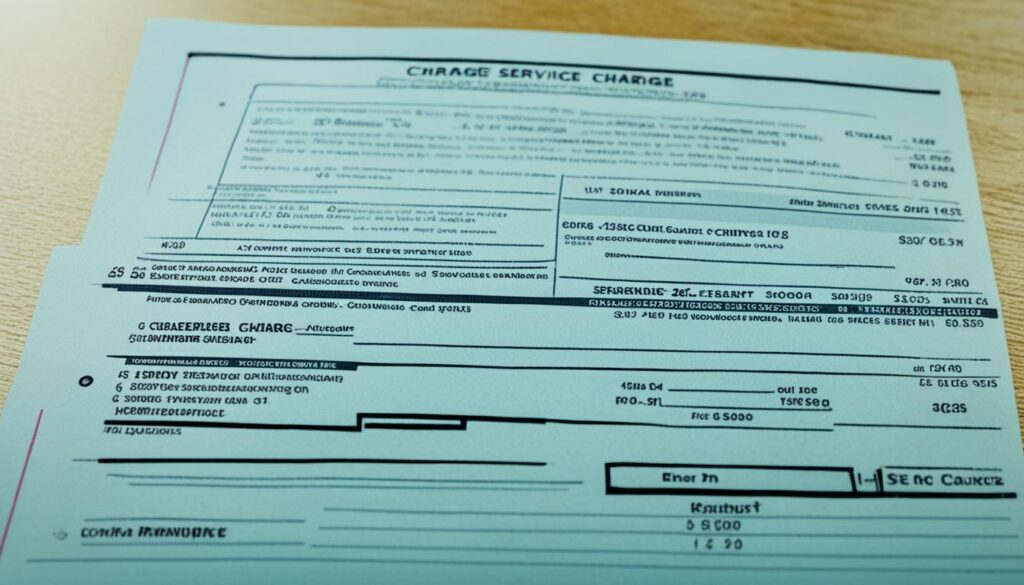As a business owner, it is important to effectively communicate and explain service charges to your customers. A service charge is an additional fee that businesses may charge in addition to the cost of products or services. By providing clear and honest explanations, you can ensure transparency and avoid misunderstandings. In this article, we will discuss what a service charge is, the advantages and disadvantages of implementing it, and provide tips on how to explain service charges to your customers.
Key Takeaways:
- Service charges are additional fees that businesses may charge on top of the cost of products or services.
- Effective communication and transparency are key when explaining service charges to customers.
- Service charges help businesses cover the extra costs associated with providing good customer service and quality products.
- It is important to be honest, upfront, and considerate when explaining service charges to customers.
- Using clear and concise language, emphasize that service charges are not penalties but are necessary to maintain quality service.
What is a Service Charge?
A service charge is a fee that businesses charge in addition to the basic cost of their products or services. It is a way for businesses to recover the extra costs associated with providing good customer service and quality products. The laws regarding service charges may vary across states and countries, so it is important for businesses to be aware of any regulations that apply to them.

| Benefits of Service Charges | Considerations |
|---|---|
| Allows businesses to cover additional expenses related to customer service and product quality. | Businesses should be aware of any local regulations regarding service charges. |
| Enables businesses to offer competitive pricing on their products and services. | Transparency is important in explaining service charges to customers. |
| Supports the maintenance and improvement of customer support and overall customer experience. | Consider how service charges may impact customer satisfaction and spending. |
Understanding the purpose and implications of service charges is essential for businesses to effectively communicate with their customers. By explaining the rationale behind service charges and being transparent about their use, businesses can build trust and maintain positive relationships with their customers.
Advantages and Disadvantages of Service Charges
When considering whether to include service charges in your business, it is important to weigh the advantages and disadvantages. Service charges can bring several benefits for your business, such as:
- Continued provision of excellent customer support: Service charges allow your business to maintain high-quality customer service without increasing prices. This ensures that your customers receive the support they need while keeping your products affordable.
- Covering hidden costs: Service charges help cover the additional expenses associated with providing good service, such as staff training, improving infrastructure, and enhancing customer experience. This allows your business to maintain profitability and sustainability.
However, including a service charge in your pricing structure may also have some disadvantages to consider:
- Reduced willingness to spend: Some customers may be hesitant to pay a service charge on top of the product or service cost, which could lower their overall willingness to spend. This may result in decreased sales and potentially impact your revenue.
- Perceived penalty for good service: A service charge can sometimes be misunderstood by customers, who may perceive it as a penalty for receiving good customer support. This perception can negatively impact customer satisfaction and loyalty.
As a business, it is essential to carefully evaluate the impact of service charges on your customers and your overall business strategy. Consider your target market, customer preferences, and competitive landscape to determine if service charges are the right fit for your business model.

Tips for Explaining Service Charges to Customers
When it comes to service charges, honesty, upfront communication, and consideration for your customers are key. They want to understand how their money is being spent, so it’s crucial to transparently explain how the extra revenue from service charges benefits them through improved customer support and superior products.
Avoid misleading your customers into thinking that your products are more expensive than they actually are. Instead, provide clear explanations about how service charges help maintain affordable prices while ensuring excellent service.
Being considerate is essential when determining the amount to charge as a service fee. Overpricing your products or making customers feel penalized for receiving good service can create negative perceptions and even drive them away.

Example Phrases:
- “We have a service charge in place to maintain the exceptional level of customer support and continually improve our products.”
- “The revenue generated from the service charge goes directly into enhancing your overall experience.”
- “Our service charge helps us keep prices affordable while providing excellent service.”
- “We want to be transparent about how we utilize the service charge to ensure your satisfaction.”
- “Our goal is to deliver top-notch service without compromising on product quality, and the service charge contributes to that.”
By following these tips and using the provided phrases, you can effectively explain service charges to your customers, promote transparency, and maintain their trust and satisfaction.
| Advantages of Service Charges | Disadvantages of Service Charges |
|---|---|
| Help cover hidden costs of providing good service | Customers may feel penalized for receiving good service |
| Allow businesses to maintain excellent customer support | Customers may be less willing to spend |
| Help businesses provide quality products |
What to Say to Explain Service Charges to Customers
When it comes to explaining service charges to your customers, having the right phrases prepared can make all the difference. By using clear and concise language, you can effectively address any questions or concerns they may have. Here are a few examples of what you can say:
1. “Our service charges cover the cost of providing exceptional customer support.”
By explaining that the service charges are directly related to the high level of customer service your business provides, you can help customers understand the value they receive in return.
2. “The service charges enable us to continuously improve our products and services.”
By emphasizing that the additional fees are used to enhance the quality and features of your products, customers will see the benefits they receive from paying the service charges.
3. “The service charges help us sustain our commitment to delivering top-notch experiences.”
By highlighting your commitment to providing exceptional experiences, you can assure customers that the service charges are an investment in maintaining the high standards they expect.
Remember, it’s essential to be transparent and honest when explaining service charges to customers. By providing these explanations, you can build trust, showcase the value of your services, and ensure customer satisfaction.

Explaining Service Charges to Your Customers
When it comes to service charges, transparency is key. As a business, it is crucial to effectively explain these charges to your customers. By doing so, you can ensure transparency, build trust, and maintain customer satisfaction.
First and foremost, emphasize that service charges are not a penalty, but rather a way for your business to continue providing excellent customer service and quality products. Let your customers know that these charges help cover the extra costs associated with delivering an exceptional experience.
It is important to be upfront and honest with your customers about how the revenue from service charges is used. Clearly communicate how it contributes to improving customer support and enhancing the overall product offerings. By providing this explanation, you can help customers understand the value they receive in return for the service charges.
By taking the time to explain service charges in a considerate and transparent manner, you can build trust with your customers. This transparency fosters a better understanding of the costs associated with running your business and helps avoid any misunderstandings. Ultimately, it strengthens the relationship between your business and your customers, ensuring continued satisfaction and loyalty.
FAQ
What is a service charge?
A service charge is an additional fee that businesses may charge in addition to the cost of products or services.
Why do businesses charge a service charge?
Businesses charge a service charge to recover the extra costs associated with providing good customer service and quality products.
What are the advantages and disadvantages of service charges?
Service charges can help businesses continue to provide excellent customer support and cover the hidden costs of good service. However, they may reduce customer spending and make some customers feel penalized for receiving good service.
How should businesses explain service charges to customers?
Businesses should be honest, upfront, and considerate when explaining service charges to customers. They should transparently communicate how the extra revenue improves customer support and products, while ensuring customers do not feel misled or overcharged.
What are some tips for explaining service charges to customers?
Businesses should emphasize that service charges are not penalties but are necessary to provide excellent customer service. They should also be transparent in their explanations, considerate in determining the charge amount, and ensure customers understand the value they receive.
